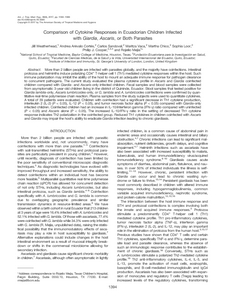Weatherhead, J; Cortés, AA; Sandoval, C; Vaca, M; Chico, M; Loor, S; Cooper, PJ; Mejia, R
(2017)
Comparison of Cytokine Responses in Ecuadorian Children Infected with Giardia, Ascaris, or Both Parasites.
Am J Trop Med Hyg, 96 (6).
pp. 1394-1399.
ISSN 1476-1645
https://doi.org/10.4269/ajtmh.16-0580
SGUL Authors: Cooper, Philip John
![[img]](http://sgultest.da.ulcc.ac.uk/109027/1.hassmallThumbnailVersion/Weatherhead_AJTMH_2017.pdf)  Preview |
|
PDF
Published Version
Available under License ["licenses_description_publisher" not defined].
Download (502kB)
| Preview
|
Abstract
More than 2 billion people are infected with parasites globally, and the majority have coinfections. Intestinal protozoa and helminths induce polarizing CD4(+) T-helper cell 1 (Th1) mediated cytokine responses within the host. Such immune polarization may inhibit the ability of the host to mount an adequate immune response for pathogen clearance to concurrent pathogens. The current study evaluated the plasma cytokine profile in Ascaris and Giardia coinfected children compared with Giardia- and Ascaris-only infected children. Fecal samples and blood samples were collected from asymptomatic 3-year-old children living in the district of Quininde, Ecuador. Stool samples that tested positive for Giardia lamblia-only, Ascaris lumbricoides-only, or G. lamblia and A. lumbricoides coinfections were confirmed by quantitative real-time polymerase chain reaction. Plasma samples from the study subjects were used to quantitate cytokines. A total of 39 patients were evaluated. Children with coinfection had a significant decrease in Th1 cytokine production, interleukin 2 (IL-2) (P < 0.05), IL-12 (P < 0.05), and tumor necrosis factor alpha (P < 0.05) compared with Giardia-only infected children. Coinfected children had an increase in IL-10/interferon gamma (IFN-γ) ratio compared with uninfected (P < 0.05) and Ascaris alone (P < 0.05). The increased IL-10/IFN-γ ratio in the setting of decreased Th1 cytokine response indicates Th2 polarization in the coinfected group. Reduced Th1 cytokines in children coinfected with Ascaris and Giardia may impair the host's ability to eradicate Giardia infection leading to chronic giardiasis.
Statistics
Item downloaded times since 08 Aug 2017.
Actions (login required)
 |
Edit Item |



